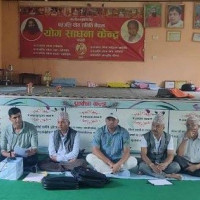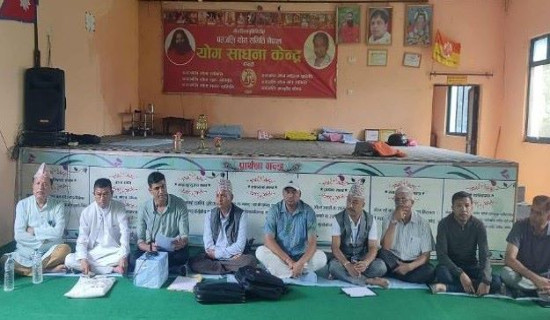- Sunday, 31 August 2025
Portable tea: Thermos vendors brewing hope
Erisha Sharma,Kathmandu, Aug. 3: Sita B.K., a 42-year-old widow, has been walking the streets with two heavy flasks slung over her shoulders for the last twelve years. After the death of her husband—who had gone to Saudi Arabia as a migrant worker—her 10-year-old son Nishan also fell ill with a severe lung infection. Even after selling all her jewelry, she couldn’t afford the ICU bills. Her son is still in Kanti Children’s Hospital.
As the morning fog lifts over the bustling streets of Kathmandu, the aroma of fresh, boiling tea cuts through the chill. From dawn till dusk, the city’s sidewalks transform into vibrant tea stalls. These are Kathmandu’s mobile tea vendors, workers who walk miles each day selling hot tea from thermoses to the city’s overlooked: traffic police, construction workers, taxi drivers, and street cleaners.
Sita said, “I leave home at 4:30 AM. By 5:30, I’m already walking toward Kalanki. I don't have money for a cart or a shop. But I have my stove. I borrowed two flasks from a neighbour who used to sell milk, and I started walking.” She walks nearly 12 kilometers a day, selling around 300 cups for Rs. 30 each.
She earns about Rs. 3,000 per day after covering the basic cost of ingredients used. But her income, though steady, is barely enough to cover her responsibilities. On top of everything, her son’s medical expenses also hold her back.
Ramesh Tamang, a 28-year-old vendor who sells on the sidewalks of Chakrapath, is from Siraha. He came to Kathmandu after a flood swept away his home.
“I start my day at 3 AM and serve nearly 200 cups a day at Rs. 30 each. However, last week, my best thermos cracked from the bottom. It leaked half the tea on the road before I noticed,” said Ramesh. He added, “Without proper insulation, the tea cools quickly, and customers complain. Good flasks cost Rs. 2,000 or more. Mine was Rs. 500 from the footpath. It lasted two weeks. If my tea cools early, I earn nothing. But buying new flasks is like gambling with your last rupee.”
Mina Bhattarai, a 36-year-old woman, sells tea near a construction site in Tinkune, mostly to masons and labourers. They call her "Chiya Didi." However, her own safety has become a daily concern. According to Mina, “Last month, a drunk man tried to snatch my flask. There was no one to help.”
Many women report being followed, verbally harassed, or inappropriately touched while selling tea in crowded areas. Women who walk alone face frequent harassment and verbal abuse. Mina keeps a stick in her bag now.
She also mentioned, “Not to hurt, just to scare. No one sees us as vendors. They think we’re just wandering beggars.”
Many other vendors are chased away from office gates, bus stops, or malls by guards who view them as a nuisance rather than workers. Customers frequently ignore them, wave them off, or treat them with visible discomfort.
Nirmal BK, a 19-year-old management student at a local college, wakes up at 4:30 every morning to prepare tea, which he sells from a small thermos near Kalanki before attending his 10 AM classes.
“It’s not easy balancing books and business. Some days I’m too tired to focus in class, but I remind myself why I’m doing this. This is how I pay my tuition, buy textbooks, and help a little at home,” said Nirmal. He also mentioned, “With no financial support and rent to cover, vending has become more than a side hustle. I’d rather work hard than drop out. This thermos is my part-time job, my scholarship, and my fight to stay in school.”
(Sharma is an intern at TRN)














